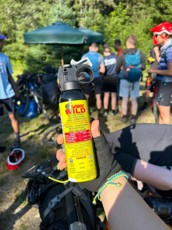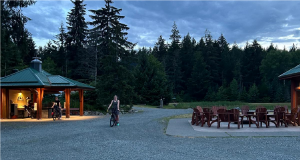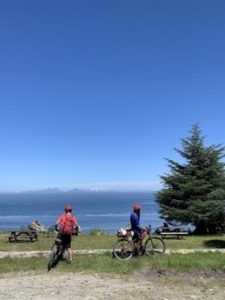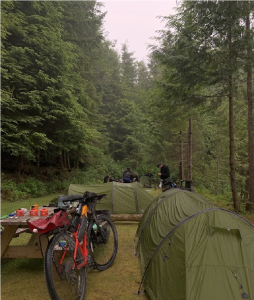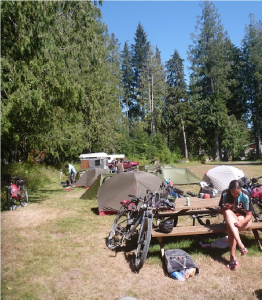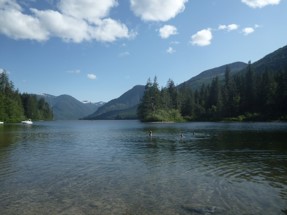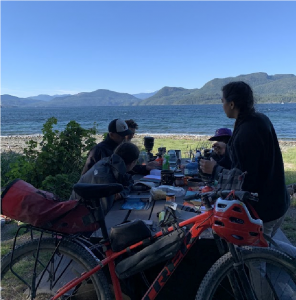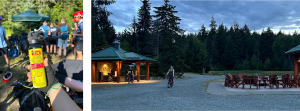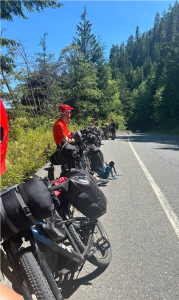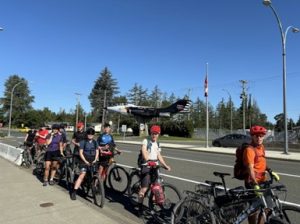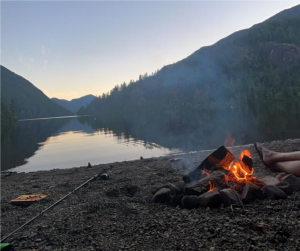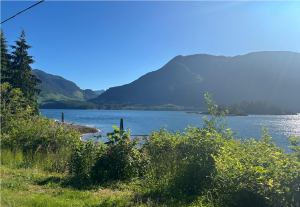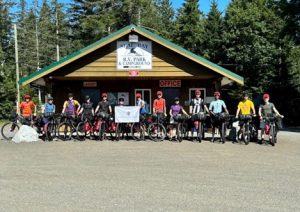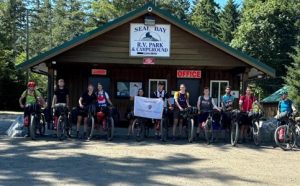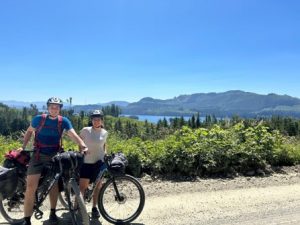Introduction
Between the 29th June 2024 and the 18th of July 2024, 13 students and 2 staff members from Liverpool University Air Squadron and Manchester and Salford University Air Squadron took part in a bikepacking expedition around the north end of Vancouver Island, tackling mountainous terrain amid an Island heatwave. Students were attempting to complete the Tree to Sea Loop, which is a 1041 km (647 miles) route with 14,823m of elevation. Distance required to cycle per day varied from 50 km to 115km. This route was 90% off-road, on gravel paths, which made it extremely testing cycling and allowed the students to reach and push their limits.
The objective of the trip was to expose students to a challenging and demanding mountainous environment through the medium of bikepacking. The expedition was self-sufficient, teaching students valuable lessons about preparation and building confidence about being able to use initiative. Students were involved in all the organisational aspects and the day-to-day elements of the expedition, so they gained experience of leadership and teamwork. Months before the expedition started all personnel had started their cycling training following a training program and recording all training on the groups Strava page. The group also had to take part and pass several Bear and Wildlife training courses, to ensure we knew what to do and what not to do in a wildlife emergency. The route allowed students to see the more remote and lesser known areas and wildlife of Vancouver Island, linked valleys, villages, coastal mountains and deep fjords. The campsites along the route can have fairly minimal facilities but make up for it in their incredible views.
It has been described as some of the best gravel riding on the coast. By the conclusion of the trip, all the students had developed personal fitness, mental resilience and bikepacking skills.
RAF Woodvale -> Seal Bay
The journey from RAF Woodvale to Seal Bay, Vancouver Island took 2 days to undertake.
The students and staff travelled by MT to Manchester Airport from RAF Woodvale and flew to Vancouver via Toronto with Air Canada. Air Canada was unanimously agreed to be a great airline to travel with. We stayed overnight in Vancouver before another coach journey to the Ferry terminal, we took the Ferry to Horseshoe Bay, Vancouver Island and then a final coach journey to the campsite.
Overall, the transport worked. One of the few difficulties we encountered was the loading and unloading of the large and heavy bike boxes, which was exhausting and time-consuming. This had to be done between all transports, including at the airport and ferry terminals. At the Ferry terminals, we had to carry the boxes significant distances.
We had planned to stop at a storage facility near the first campsite to leave the boxes and anything we didn’t need for the bikepacking part of the expedition. However, the incredible staff at Seal Bay Rec Site allowed us to leave the equipment there, as it was also our final campsite and was logistically a better and easier alternative. Another issue we faced at the start was a lack of bear spray in the nearest shops to the campsite. An essential and required piece of kit that hopefully we wouldn’t have to use. A few group members had to order a taxi and source the spray early on our first morning of cycling which delayed the start.
Seal Bay to Campbell River 01/07/2024 (60km)
The first day route was planned to take place between Seal Bay Recreation Site to a site over 90km away. The cycling that day consisted mainly of highway cycling with some single and gravel tracks at the beginning of the route. We immediately noticed how much harder it was to cycle on the gravel tracks compared to the tarmac highways.
We learnt how much of an impact food had on the weight of our bikes. Most of the group had over-bought at the big Walmart before the trip which weighed the bikes down significantly. We also found out it was unrealistic to cycle in a big group all together, so we had to make plans to ensure people didn’t get left alone. A final learning point related to the weather. Unfortunately, there was a heatwave over the western part of British Columbia (BC) over the whole 2 weeks of cycling. As we’d left the campsite quite late in the morning, we spent a lot of the first day cycling in the peak of the heat. We had to make a difficult decision to cut the first distance shorter than planned after a group member slightly injured themselves. This was demoralising but we were determined to get back on track on day 2.
Initially we had thought the route was marked clearly throughout the island, however it became clear early on that constant navigation and route adjustments were required based on terrain. Without GPS, navigation would be challenging. (Local route maps are available but the scale is 1-250,000!)
During the cycle we saw an array of wildlife including our first sighting of a bald eagle. Once we arrived at Elk Falls Campsite, we passed the evening by cooking dinner and heading to the river to wash.
A major issue we encountered early on was the lack of available transportation, especially for bikepackers as the bus company now no longer carries bikes. The injured member who could not continue with the full route for health and safety purposes returned to the original campsite with another volunteer. This would ensure that we could remain in contact and check-in with each other throughout the day.
We also realised how minimal the signal was over the island, fortunately we had 2 Garmin In-Reach GPS Trackers with satellite mobile communication. These can send and receive text messages, wherever you are. They also have an emergency communication capability. Definitely a requirement for a wilderness expedition. The 2 staff members also had signed up for an ‘E-sim’ giving the ability to make calls and text at no extra cost. Again, highly recommended.
Campbell River to Gold River 02/07/2024 (93km)
We set off from Elk Falls early as we had a long distance to cover in order to reach Gold River. Students paired up to take turns researching the route and navigating. We navigated using the app Ride with GPS.(The recommended App by BikePacking.com, ensure you download the route before setting off) The start of the route was incredibly hilly, but we managed to maintain a good pace along the highway. The highways were more difficult psychologically, as the views were repetitive, and we had to stay in single file. Unfortunately, we ended up having to stop for over an hour to sort out issues with the bikes. We had a few punctures and some of the panniers started to break. After damage control with zip ties, we rearranged our kit, putting thought into balancing the weight equally over the whole bike to minimise the strain on individual bags and straps. In hindsight, we wished we’d done a bit more training and preparation on bike-fixing.
After the hills we rejoined the Tree to Sea loop and were back on gravel tracks for around 30 kilometres before rejoining the highway, traversing the rugged cliffs guarding Campbell River. We followed this highway all the way to Gold River. Although the route was littered with climbs, there were incredible views and a massive downhill into Gold River that made up for it. Going downhill we had to be very careful not to burn out our breaks. After a brief resupply, we spent the evening at the camp washing in the river and cooking while avoiding the many mosquitos.
Gold River to Tahsis 03/07/2024 (77km)
We left the campsite at 0830 and headed toward the Gold River visitor centre to fill up our water before setting off along the route to Tahsis.
We were still getting used to the routine of taking down tents, eating breakfast and fully packing up the bikes at this point in the trip, which took a significant chunk of time that we initially underestimated. After the bike issues on day 2, we focused on doing thorough checks of the whole bikes before starting, particularly checking the pannier rack bolts which were prone to loosening.
The route today was particularly tough with 1300m of elevation, including a 12 mile climb toward the beginning of the route. Once we reached the top of the long hill, we stopped at Upana Caves for a break and an exploration.
There were high temperatures due to a heatwave on Vancouver Island and we managed to take a few wrong turns before finally reaching the cave’s entrances. Once we had explored the caves we set off for the remainder of the route.
Along the way we cycled within 10m of a black bear standing by the road and stopped briefly at the slightly underwhelming Three Sisters Waterfalls. We then had a steep descent into Tahsis where we called into the Ocean View Restaurant for a meal out as a treat.
Unfortunately, the grocery store in Tahsis did not have much of the kind of food we needed for our next two days of bikepacking. The campsite was situated on the shore of the Tahsis inlet surrounded by mountain peaks. Once the tents were set up we went for a swim and shower before washing our clothes at the campsite facilities. From the campsite we saw more bald eagles as well as some playful sea otters and seals. The route and view can be shown respectively below.
Zeballos to Atluck Lake 04/07/2024 ( 38km)
We woke up on the shores of the Tahsis Inlet. We started the day with a ferry journey. The boat was so small we had to split into two groups.
The journey had some of the most breathtaking scenery any of us had ever seen capped off with some incredible wildlife. Once we arrived, replenished supplies in the shop at the arrival port of the water taxi and began to fish whilst we waited for the others to arrive. Once the others arrived, we set off on our cycle to Atluck Lake. The route wasn’t very long that day however it was littered with sharp climbs. The gravel roads were incredibly dry so whenever a vehicle drove by a cloud of dust would obscure our vision. We started using balaclavas and shirts to cover our faces.
We arrived at the campsite situated on the shores of a mountain lake surrounded by forest. There were signs of bears in the area as seen by claw marks, so we took extra precautions to tie up food and use facilities further from the campsite. After 3 days of cycling for longer periods than we expected, it was lovely to arrive at the lake at 4pm so we could enjoy the water before sunset. After setting up camp we swam, ate and fished before calling it a night. We had a group discussion about how we were feeling physically and mentally to plan the next few days of cycling appropriately.
Atluck Lake to Port Alice 05/07/2024 (75km)
Today, we cycled from Atluck Lake to Port Alice. There were very high temperatures upwards of 25 degrees, with some of the highest gradient hills any of us had ever cycled up. Actually, glad we got another early start.
As a group we dealt with the physical challenges differently. Some people preferred to pair up for the hills whereas others went by themselves to focus on the hardest sections. We were relieved to go another full day with minimal bike issues.
As a group we were still learning what food worked best for us. Some of the group over-ate at the start and some people didn’t eat enough fruit and vegetables. This was starting to show by day 5 where we made lighter and more nutritious choices at the supermarket. By this day we’d got into good morning and evening routines. After setting up camp we swam in the ocean as a whole group. Getting through challenging days together was very bonding.
Port Alice to Holberg 06/07/2024 (90km)
Departing early, we set off from Port Alice to head to Holberg. The early start was due to a number of factors including the heatwave and long distance that day.
The elevation was particularly challenging. However, we were rewarded with a very long descent into Holberg. Finding water sources was a challenge along the second half of the route; it was difficult to work out if small water features on the maps were actually accessible from the roads. Some of the group ran out of water mid-climb and resorted to using MSR water filter pumps in the small streams.
(MSR Hyperflow – The HyperFlow microfilter utilizes the latest Hollow Fiber Technology and our most advanced engineering to make water treatment so small and so easy to use, it will change the way you travel in the backcountry. Its ergonomic design, diminutive size and tool-free maintainability make it just as appropriate on day trips as it is on multi-day excursions. Add a filtration rate of 3-liters per minute and you’ve got the most efficient microfilter ever created.)
Lesson learned and for the rest of the trip we carried extra water from the start and were more thoughtful about how much water we drank in the mornings before leaving camp. Yet again, arriving in Holberg we found that the one grocery shop didn’t supply much substantial food.
The owner of the general store was renowned for bike fixing and was incredibly generous with his time and resources, helping us to repair broken panniers and other bike issues. Fortunately, we were staying next to the Scarlett Ibis, Vancouver Island’s most remote pub. In the evening we built a fire and had marshmallows before some of us stayed in cabins and the others camped.
Holberg to San Josef Bay (and back) 07/07/2024 (44km)
This was technically our ‘rest’ day, due to the extended longer ride the previous day. With an extra night in Holberg. The group decided on a short cycle day to visit San Josef Bay (voted one of the best beaches in the world).
The beach was only accessible via a 2km woodland walking path from the car park. After some cold water therapy (swimming in the Pacific Ocean, average temperature 09 degrees C!), we explored the beach area.
After a delayed cycle back due to a quick puncture fix, some stopped at Ronnings Garden. We spent most of the afternoon back in Holberg to ensure we had enough time to service and check all the bikes and collect repaired equipment from the General Store, in preparation for the second half of our journey. As a group, we were all incredibly grateful to have a lighter day to recuperate and we started our next day with a new burst of life.
Holberg to Port McNeil 08/07/2024 ( 81km)
Wheels were at 0630! this morning as some had bike issues that could be sorted at Port McNeil if we made it before the bike shop closed.
The route started very hilly and on gravel paths however, a few hours in, the terrain started to flatten out and we joined onto the highway. We cycled past the famous shoe tree. A couple of the group members had a slight crash today whilst chatting and admiring the views! Fortunately, no injuries or damage to the bikes. This highlighted the importance of keeping some distance between each other when chatting on the wide logging roads. A long stretch of the cycle was into a headwind, so we spent lots of time in groups, using each other’s slipstreams to save our energy.
We split up in Port McNeil, so some students relaxed and seal-watched, while the others went to the bike shop. Unfortunately, due to short opening hours and several bike issues that were too significant to fix before the shop closed that afternoon this meant we had to change our plans for the following day. We discussed options and having spoken to the staff at the bike shop, we decided to go and stay on Malcolm Island, famous for its whale watching.
Sointula Island Campsite to Bere Point 09/07/2024 (22km)
This was a total bonus day, necessary because of the bike repairs we needed before we continued our journey. Once the bikes had been fixed, we boarded a ferry for Malcolm Island and found our gorgeous campsite. This journey took around half an hour.
Once there, we cycled to Bere Point (a well-known whale watching spot). Although we did not see any whales, the beach and surrounding area was lovely, and a few students spotted a porpoise. We found an orca research hut on the beach and had an incredibly interesting conversation with the researcher who had worked there for 28 years.
At the campsite we discussed the pros and cons of different journey options for the last 4 days of the trip. We decided to try and get the majority of the distance done in the first two days. To finish off our second ‘rest’ day we took part in some contrast hydrotherapy using the sea and the sauna at the campsite.
Port McNeil to Woss Lake 10/07/2024 (71km)
On this day we woke up bright and early to catch the first ferry back to Port McNeil. After a big supermarket restock, we breezed through an issue-free day, perfecting our slipstreaming. This meant we arrived at Woss Lake early enough that we had lots of time to appreciate what ended up being one of our favourite locations. We all spent lots of time in and on the shore of the gorgeous lake, washed clothes and ate before an early night.
Woss Lake to White River (Sayward Junction) 11/07/2024 (73 km)
We left Woss Lake at 7am to cycle to Sayward Junction, which was 73 km away. At Sayward Junction we were staying at the White River Campsite.
The route was a mixture of Highway and Dirt tracks. Along the first track the group was lucky enough to see a massive herd of Elk running down the hill and across the track in front of them.
Once we were sorted out at the campsite we headed to the shops for a re- supply. When we got back the group headed to the river for a paddle and to cool off. As a group we voted to cycle the longer distance to Elk Bay the following day, which sums up the determination and optimism of the group at this point. Despite tired legs, everyone joined in for a few games of basketball, football, American football and disc golf before treating ourselves to a group dinner out. Finally, we headed back to the campsite for a campfire before bed. We were incredibly lucky to be travelling around the island just before the wildfire ban came into place on the 12th July.
White River to Elk Bay 12/07/2024 (52km)
We set off from White River a bit later than most other days at 0800 as we only had 52km to travel. We started off the day on the Highway before returning to dirt tracks for the last 28km. The longer route we’d opted to cycle the previous night consisted of more gravel tracks. However, we made the decision to stick mainly to the highways to help minimise the risk of worsening the damaged bearings on one of the bikes.
The group morale was high and we had another day without major issues meaning we arrived at Elk Bay early in the afternoon. The campsite was right on the beach which was stunning but unusually very windy. We used our jackets for the first time which indicates how amazing the weather had been throughout the rest of the trip. We all managed to pitch our tents despite very hard ground.
Some students had to repurpose large rocks to help pin the tents down, but they all made it through the night. Elk Bay was also one of our favourite campsites. In our spare time in the afternoon, we joined forces to create a raft with all the spare driftwood. After the failed attempt at sailing and a little swim we all washed off in the river and cooked together while chatting, reading and writing in journals. We were out of signal range for most of the trip which meant we hardly used our phones. It was refreshing to disconnect from the rest of the world.
Elk Bay to Seal Bay 13/07/2024 (86km)
We were relieved to wake up with all 11 tents intact after a windy night. We set off from Elk Bay at 0700 as we had a big day to get us back to our start point. Spirits were high despite the large distance to cover. The first 20 km was off-road and extremely hilly. We all agreed it was one of the hardest sections of the trip.
The gravel hills were non-stop and so steep we had to walk parts of them. It took us quite a while to complete this section! After that we hit the highway for 18 km into Campbell River where we stopped in town for some refreshments. Continuing en route, we headed back towards our start point and stopped for a restock at the same place we’d stopped at on day one which felt like a full circle moment.
We did the final leg together and arrived back at the campsite in formation. We were welcomed back with decorations and a picnic. It was a lovely finish to an incredible cycling trip. We spent the evening sorting our kit and relaxing followed by an intense game of football, cards and stargazing.
14/07/2024 – (Rest Day at Seal Bay)
As a group we debriefed the trip, discussing our highlights, lowlights and lessons.
Comox RCAF visit 15/07/2024 (35km)
After a rest day we returned to our bikes. We cycled into Comox in order to visit the RCAF base. We were incredibly grateful for the opportunity provided by an Officer we met also cycling the Tree to Sea loop.
We were shown 442 Squadron, Canada’s busiest search and rescue unit. We learnt all about their function, kit, roles and aircraft. We got shown around one of their Cormorant rescue helicopters by a Pilot and two Search and Rescue technicians. After exploring the town of Comox, we headed back to Seal Bay where we cleaned and disassembled our bikes. We packed them all away in bike boxes ready to travel back home. Unfortunately, the cardboard boxes were slightly worse for wear after the outbound journey but nothing a lot of tape and cling film couldn’t fix. We finished our day eating dinner with the amazing woman who ran Seal Bay rec park to thank her for her help.
Quotes from students
“Ex Bear Escape was an unforgettable trip and the experience tested and developed me in many different ways. Physically, it required endurance and strength and mentally it required focus and perseverance. On this trip I learnt how to pace myself and built bonds with my team that helped us work together to complete this journey. The trip wasn’t about reaching the destination, it was about developing important attributes, and these will remain with me my whole life.”“Embarking on a 15 day bikepacking expedition in Vancouver Island was a true test of mental and physical endurance. The rugged terrain, unpredictable weather and long hours of cycling challenged me every step of the way. There were moments when I felt exhausted and pushed to my limits, but the stunning landscapes and the sense of accomplishment with each passing day made it all worthwhile. The journey not only strengthened my body but also tested my determination and resilience, leaving me with unforgettable memories and a profound sense of achievement.”
“Ex Bear Escape was an incredible experience that offered a great amount of challenge. Having never been to Canada before, from the first day we arrived in Vancouver to all the days of hard but fulfilling cycling, it was full of new experiences and newly learnt skills both in technical biking skills as well as mental resilience. The days were often rather long and hot, but we were able to mitigate against this by leaving early and keeping a steady pace. The atmosphere at the campsites after a solid day’s cycling was always a great reward. This was the longest I had spent consistently in the outdoors and the experience has definitely given me a further appreciation of nature and wild camping. Overall, it was truly a once in a lifetime opportunity that I am immensely grateful for. Completing it gave myself a sense of pride and I am sure that this is the same for everyone who attended the expedition.”
“I couldn’t be more grateful for the once-in-a-lifetime opportunity to take part in this incredible journey. It tested my mental and physical limits in ways they’ve never been tested before meaning I finished with a huge sense of pride and new belief in what I can achieve. I also made lifelong bonds with some incredible people. It was equally terrifying and thrilling, exhausting and exhilarating. I think we all learnt a lot about ourselves and the logistics of planning and carrying out expeditions. The trip has deepened my love for the outdoors and highlighted the incredible opportunities available in the military.”
“I’m still in disbelief that I actually took part in this trip, it feels like a dream! The bikepacking enabled us to see so much of that amazing part of the world. The trip helped me develop my physical fitness, resilience, organisational skills, team working skills, adaptivity and so much more. We were responsible for our own shopping, cooking, general organisation and bike maintenance and we took turns planning routes and navigating for the group which left us feeling empowered. Despite the huge challenge, I had the best two weeks”

